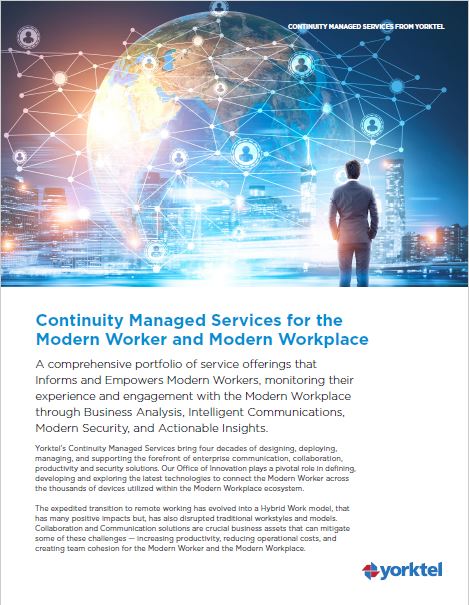There are several types of managed services solutions available in today’s complex IT landscape. To decide which service is best for your business, you should be familiar with what’s available and the different solutions that they provide.
Types of Managed Services
There is a wide variety of managed services solutions available, with many tailored to fit the highly specific needs of today’s modern business world. Here we look at the five most commonly used managed services.
1. Managed Support Services
Managed support at its most basic level includes IT helpdesk services, where a team of experts respond to incidents logged by users via phone, email, or online. Additional on-site support is often included to attend to a physical location, such as an office or factory, where an expert technician travels to the location to repair an issue that can’t be remedied remotely. This can be the repair or replacement of cabling, routers, servers, and other IT equipment.
2. Enterprise IT Managed Services
Enterprise IT managed services cover the technological requirements of large corporations with multiple departments, divisions, and offices. It typically includes the installation, repairs and management of an organization’s entire IT system, from servers to basic laptops and printers. Other elements that may be included in enterprise IT managed services are data backups, remote management, network monitoring, and cybersecurity systems.
3. Managed Monitoring Service
The ever-increasing number of devices required to run a business in today’s hybrid work environment means more opportunities for endpoints to fail and reduce productivity. Managed monitoring services allow companies to quickly determine device issues & alert the team of any end-point issues. This ensures your IT systems enjoy maximum uptime with no interruption to business.
4. Managed Security Services
The rapid rise of cybercrime over the past decade has left many businesses unable to protect their company data sufficiently. Security is now a critical element of managed services that businesses use to help safeguard their data, commonly involving network monitoring, intrusion detection, and incident response.
5. Managed Cloud Support
Cloud services are becoming increasingly popular as businesses continue to adopt a more hybrid work environment. The reduced costs and hands-off management is especially appealing to businesses, meaning in-house IT staff can focus on other tasks.

Continuity Managed Services for the Modern Worker and Modern Workplace
Yorktel’s Continuity Managed Services bring four decades of designing, deploying, managing, and supporting the forefront of enterprise communication, collaboration, productivity and security solutions.
How the different types of managed services are used
Here are a few examples of how different companies use managed services products to support their IT needs.
Managed Support Services
Companies that don’t have an in-house support team typically enlist the help of managed support services to resolve issues as they arise. The support services team will provide a contact number and call-logging system for users to report issues or request assistance. This involves anything from rebooting a system to visiting a user on-site to investigate a hardware issue.
Enterprise IT Managed Services
Enterprise IT Managed Services are useful for larger companies that have complex infrastructure and need additional expertise that is beyond the scope of their local IT team. It typically involves the acquisition, provision, and installation of all enterprise-grade IT infrastructure that can support collaboration across multiple offices and regions.
Managed Monitoring Service
A monitoring system keeps a close eye on the health of each and every device of an organization. This typically involves the implementation of a managed monitoring system that uses AI-enhanced algorithms to pre-empt issues and avoid downtime. It also typically allows for automated alerts to ensure any potential or real time issues are dealt with quickly.
Managed Security Services
A managed security service protects an organization’s data and secures the network against hackers. Besides basic network security and firewalls, managed security services provide 24/7 network monitoring, data encryption services, and advice on employee security best practices.
Managed Cloud Support
Cloud services may be required when you need support for cloud-based solutions such as Software-as-a-Service (SaaS), Platform-as-a-Service (PaaS) and Infrastructure as a Service (IaaS). For example, if your organization hosts its servers on the popular IaaS platform Amazon Web Services (AWS), you may need the aid of cloud services to keep everything running smoothly.
Which types of managed services solution do you need?
It’s important to choose the right managed services for your business so that you get the best value for money without paying for services you don’t need. Factors to consider when choosing managed services for your organization are existing IT staff and their depth of knowledge and experience, number of employees, business type, and requirements.
Existing IT staff
If your business is growing beyond the capabilities of an in-house IT team, you may need to outsource your needs to a managed service provider. Without adequate IT support, your organization could suffer downtime and lose out on critical business revenue. Yorktel’s on-site Staff Augmentation Services provides business with additional staff members with flexible options for short or long term, temporary and contract-to-hire.
Number of employees
The number of employees you have will determine the type of IT managed services that your organization requires. Large companies usually require additional infrastructure support or cloud services to meet their security, data management, backup, and disaster recovery needs. Yorktel’s Continuity Management solution provides security and compliance measures to meet ISO 9001 and ITIL policies and procedures with proactive incident identification and resolution.
Business type
Depending on the type of business that your organization undertakes, you may find you could benefit from changing the way your IT strategy is implemented. To harness the true power of your IT systems, you need experts to gather and analyze critical data that reveals how your business could be more productive, highlight opportunities for improvement and maximize your ROI.
Speak to one of our advisors today for more information about how Yorktel’s suite of managed services can help reduce your IT costs and maximize your business productivity.
